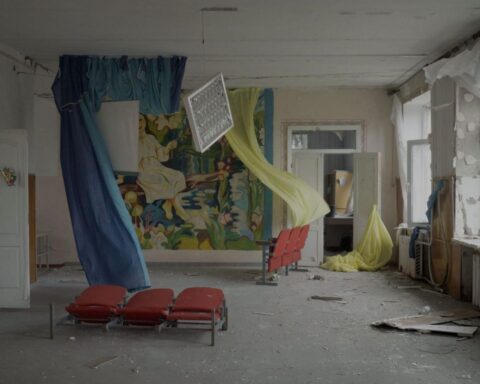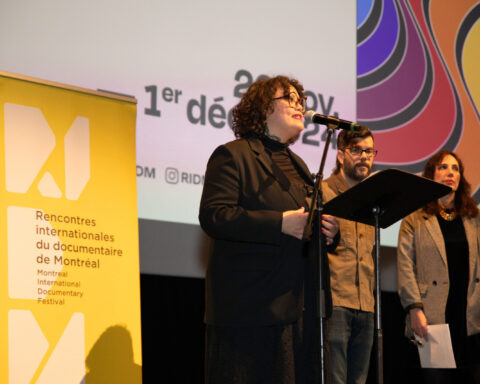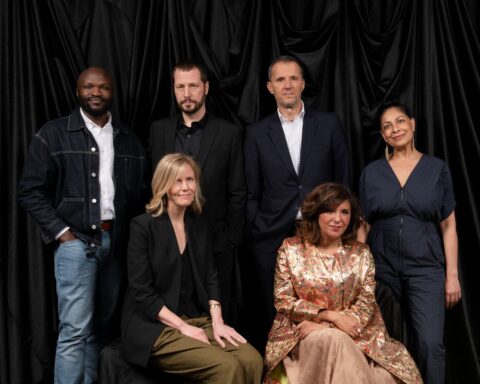n the Name of Scheherazade or the First Beergarden in Tehran
(Germany, Iran 75 minutes)
Dir. Narges Kalhor
A playful mashup of styles and subject matter, Narges Kalhor’s movie typifies an accelerating tendency to discard the traditions of old school documentary filmmaking. What would John Grierson think of a doc in which a tacky set, green screen composites, and Indian shadow puppetry relay tales told by Scheherazade to calm King Shahryar, who married a woman every night and had her beheaded in the morning? And that’s just part of a stew that includes sex dolls and Iranian women dressed as Bavarian bar maids.
Scheherazade, the brilliant storyteller of the 1001 Nights, was an ancient Persian Queen while Narges Kalhor is a 21st century Iranian woman who has her own fantastical tales to tell. Of the post Iranian revolution generation, she appears as a character in her own film, pointing out that for women like her, discos, drinking, makeup, and wearing your hair loose were strictly, dangerously taboo. The mullahs had and continue to have the power to chop your head off.
Kalhor and her friends read a lot, saw plays and went to the movies. She studied filmmaking in Tehran, actively opposed the regime, and in 2009, sought asylum in Germany after being warned that her provocative films placed her at risk. In a real-life twist, Kalhor’s estranged father is Mehdi Kalhor, once advisor to former ultra-hardcore President of Iran, Mahmoud Ahmadinejad. Naturally, Kalhor Sr. claims that his daughter is a dupe of the regime’s opponents.
Beautiful, wily, and the epitome of seductive power, Scheherazade is a rebel against patriarchal authoritarianism. As the action of the doc unfolds, Kalhor is like the Queen, or Fellini in 8½, busy working out the narratives of the film we are watching. Her picture goes meta at times, especially in the witty ending that literally takes you behind the scenes.
In the Name of Scheherazade or the First Beergarden in Tehran is sexy, irreverent, and preposterous, a somewhat Pythonesque, punky subversion of authority. If daddy sees this movie, he’ll throw his samovar at the wall. Mullahs would collapse in apoplectic paroxysms and get somebody tortured just to relieve the tension.
Apart from Kalhor herself, the film’s principal characters are two women: an Afghani artist and a burgeoning entrepreneur determined to open a beer bar in Iran, where alcohol is illegal, as well as a gay Syrian refugee, We watch the asylum seeking refugee, a young guy, get interviewed by a not particularly sympathetic, bureaucratic immigration official. Meanwhile, in the artist’s studio, a crew of deadpan male assistants carefully paint the labia of sex-doll vaginas as she pulls on a burqa, covering her entire body. Later, at her installation, the dolls hover overhead, and the artist unflappably throws off the garment. The crowd applauds enthusiastically, no doubt congratulating themselves for their enlightened views. Someone says that the sex dolls imply the stoning of women. She points out that women are suppressed everywhere, not just in her homeland.
Meanwhile, the Beer Garden entrepreneur hustles her dream of bringing “Bavarian coziness” to Iran. Like a contestant on The Apprentice with a nutball idea, she explores her project, finding out about the history of the “beer revolution” in Germany, the inner workings of a brewery, and how to make alcohol-free beer. She also discovers the word beer is taboo in Iran. After training waiters in Bavarian outfits, learning to bake pretzels, and getting ready to launch, she talks to an Iranian official who nixes the deal. Why not export our 2000 year old gardens?, he wants to know. “Why import that lavish culture?” Iranian authoritarians have a special gift for self-satire.
Similarly, as we watch the doc, a male voice sounding like a producer makes disparaging comments to Kalhor. He thinks the scene with a pile-up of naked men, focusing on asses and glimpsing penises, is “disgusting.” Stick to the beer and your homeland, he barks. “All that artist and refugee stuff is too much”; escaping from Mullahs is entertaining. “Stick to that beautiful story: the invention of beer and your escape.” It turns out the actor who plays the reclining, hookah-puffing King Shahryar voices the producer, a voice of negativity like the nasty critic in 8½.
In the midst of the phantasmagoria, Kalhor cuts to a fashion show, sexy models striding down the runway in niqabs and suggesting dominatrixes. Add to that someone in a tree costume out of Pewee’s Playhouse lifts Scheherazade’s gown, covers her bare leg and later on, still in costume, is seen chugging from a beer bottle. A timeline clock clicks rapidly back to 3500 B.C. when supposedly beer was invented in Iran.
“That’s not true,” a character says to Kalhor.
“But I read it on Wikipedia,” the filmmaker answers in this movie in the name of Scheherazade, the fabulizing survivor and resistor against murderous kings, mullahs, and patronizing film producers. Kalhor spins tales, undercuts them, plays with a reality in a movie that ultimately takes a deep breath of freedom. May this daughter of a tyrant’s henchman prosper and live to tell many stories.
In the Name of Scheherazade or the First Beergarden in Tehran screened at RIDM.












